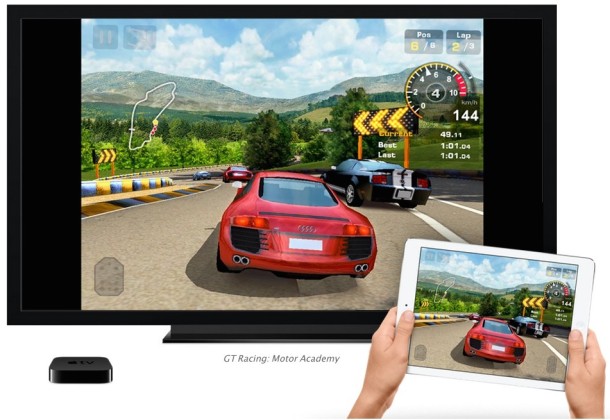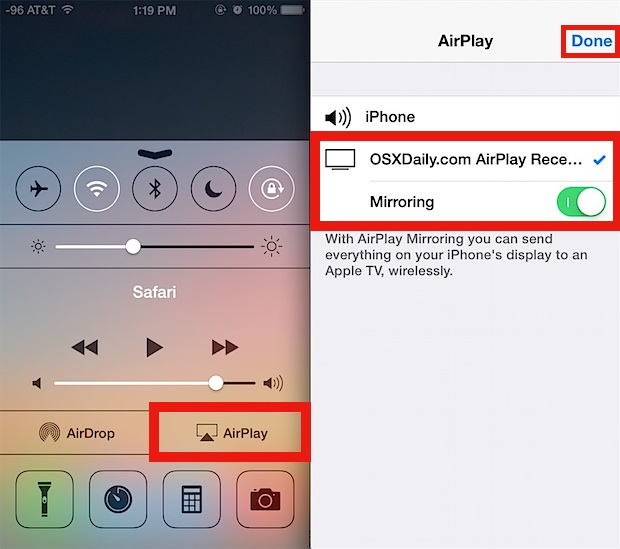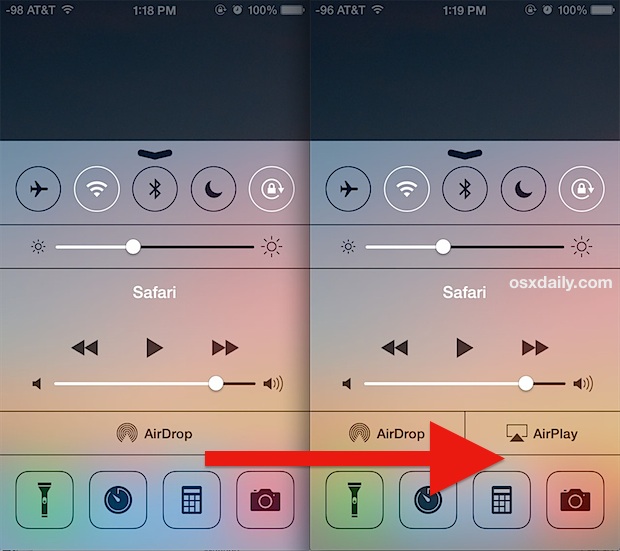How to Enable AirPlay Mirroring in iOS to Stream an iPhone, iPad, or iPod Touch Display Wirelessly (iOS 10, iOS 9, iOS 8, iOS 7)

AirPlay Mirroring sends exactly what is on the iPhone or iPad screen wirelessly over to an Apple TV or a compatible AirPlay receiver app on a Mac or PC like Reflector or XBMC, including the audio stream if one is available. This mirroring feature is great for demonstrations, presentations, picture slideshows, watching video on a larger screen, gaming on a bigger display, recording an iOS device screen, and so much more.
While iOS AirPlay Mirroring is simple to use, how it works can cause some confusion and lead some users to believe it’s not working at all. Furthermore, AirPlay and Mirroring is hidden by default in iOS, and you’ll need to meet a few basic requirements before finding the feature available for usage on any iOS 9, iOS 8, or iOS 7 device. This makes it a bit different than how it works from a Mac where it’s always visible but not necessarily usable, but once you learn how to use it on your iDevice, you’ll find it’s not complicated.
AirPlay Mirroring Requirements for iOS
- An AirPlay receiver / server – this can be an Apple TV, Reflector, or XBMC, etc
- The iPhone, iPad, or iPod touch must be new enough to support AirPlay Mirroring, running iOS 7 or newer
- Both the sending iOS device and the receiving AirPlay device must be on the same wi-fi network
Assuming you meet those basic requirements, you can get started streaming the iOS screen over to a bigger display.
How to Use AirPlay Mirroring in iOS
Before doing anything else, be sure the iPhone, iPad, iPod touch is on the same wireless network as the AirPlay receiver, this is necessary otherwise the two devices won’t be able to communicate with one another.
- Power on the Apple TV, or launch the AirPlay Receiver app on a computer
- Swipe up from the bottom of the iOS screen to bring up Control Center
- Tap the “AirPlay” button
- Choose the name of the AirPlay receiver device from the menu, then toggle “Mirroring” to ON to send the iOS screen to the receiver

The iPhone, iPad, or iPod touch screen will now instantly appear on the Apple TV, or the Mac or PC if they are running an AirPlay receiver app.
Using an iPhone mirrored over to a Mac running the Reflector app as an example, this is what it will look like:
It’s important to note that the AirPlay option will not be available if the receiver device is not found. Thus, if “AirPlay” is not visible in Control Center be sure the AirPlay receiver is online and active (meaning, if it’s an app that the app is open and running on the computer), and double-check that both AirPlay streaming devices are on the same wireless network.

These are the two most significant errors encountered with using AirPlay and AirPlay Mirroring in iOS, and fortunately are extremely simple to resolve. If you find that only audio is streaming over and there is no screen display showing up on the receiver device, you probably simply forgot to toggle the “Mirroring” option ON from the Control Center, so just swipe up again and enable it as described in step 4 above.
Sending an iPhone or iPad display mirrored over to an Apple TV will just display the home screen or open app, with the remainder of the TV having black bars. While AirPlay Mirroring is active, the titlebar of iOS will often turn blue to indicate that mirroring is enabled, I say ‘often’ because it doesn’t happen all the time with all devices, thus it’s not reliable enough to be a guaranteed indicator of AirPlay activity.
As of now, Apple only supports AirPlay Mirroring output to an Apple TV, but if you don’t have an Apple TV yourself you can still use the feature and try it out yourself by utilizing third party apps that run in OS X, Linux, or Windows, like the aforementioned Reflector, or XBMC. The latter app is free, whereas the other two options are paid with free trials, all of which make for excellent apps that are well worth exploring for those interested in wireless streaming of the screen of an iPhone, iPad, or iPod touch.
Turning Off AirPlay Mirroring in iOS
Finished mirroring the iOS screen to another display? Disabling AirPlay Mirroring is super simple:
- Flip up from the bottom of the screen to open Control Center again
- Tap on the ‘AirPlay’ button (it should be in white) and select the devices name from the list (for example, iPhone or iPad)
- Tap “Done” to close out both the AirPLay and the mirrored stream instantly
Simply swiping the “Mirror” option to OFF will turn off the display while keeping the AirPlay audio stream active, thus you’ll want to tap onto the device name to turn off the entire feature.
Of course, the AirPlay streaming feature isn’t limited to mirroring, and the same technology can also be used to stream music and much more.
Update: As pointed out by Nevin in the comments, AirParrot now brings mirroring to Macs, not iOS devices.



The Holy Grail is to get content via Cellular LTE and stream to the Apple TV device for display, as that would allow use of “unlimited data” cellular plans to access the desired content. Unfortunately the Apple TV streaming requires WiFi network connectivity, and when the iPhone is connected to WiFi, then it won’t use the LTE cellular connection.
Is there a way to selectively enable simultaneous cellular AND WiFi in a way to achieve the above functionality?
Yes, the lightning adapter cable to HDMI will perform this directly to a TV, but if you’re using an Apple TV to send audio over the optical connection, the streaming option would keep the hardwired setup constant.
Why cant i see the mirroring switch on iOS
Or AirPlay in iPhone 6s
Help me plzzzz
Why cant i see the mirroring switch on iOS 7.1.2?
please i need help!
I swipe up on ap2 and toggle on Apple TV but there is no mirroring toggling option available ? Help
I swiped up on my phone and see “airplay”, but the toggle button is not available. It is showing an “Ipod Touch” icon instead of the computer icon. I am on the same network and using Reflector. Please help.
If I am connected to my wirelesss router A example and watching the video streaming from youtube or whatever site, could enable my ipad 2 mini retina with IOS 8.1 airplay mirroring to stream my screen to my LED TV?
Meaning there will be 2 wireless network working at the same time.
One network stream from internet via broswer or app, second one airplay mirror to LED TV with xmbc or any compatible airplay mirror.
Hey I recently got Reflector.
You see, the problem is Im all set up, I swiped up on my phone and saw “airplay”.
Heres the catch though, once i press airplay and click on my computer and apply “mirroring”, It does nothing for around 10 seconds, cancels it and checks back onto “Ipod Touch”.
Help por favor? would be much appreciated
Not impressed with Reflector and Airplay. Here’s my experience with the latest version of Reflector (1.6.3.5) installed on iMac 10.9.4
iPhone with iOS 7 – Airplay icon is there, but the mirroring switch does not appear.
iPad 2 with iOS 7 – Airplay icon is there, mirroring switch appears but keeps dropping Airplay connection.
iPad Retina and iOS 8 – Airplay mirroring works perfectly.
I have the same problem in that the “Mirroring” toggle switch does not appear in the AirPlay area after selecting the receiving device (my PC). I have an iPhone 4 that I just updated to iOS 7.1.2. I am using Mirror360 on my PC.
Same problem.
Iphone 4 – Shows PC – but no mirroring option.
Anyone know why?
same prob as those before me
I think it doesn’t work with iphone 4, it should be iphone 4s and above, last night i went to a shop and he gave me an HTMI cable it worked with his iphone which was iphone 4s but didn’t work with my iphone which is iphone 4, simiarly on the reflector’s campatibility list iphone 4s is listed but iphone 4 is not listed,
What do you do if the Airplay icon does not show up at all? It doesn’t show up on my 4S or Ipad.
XMBC does not support Airplay Mirroring… It will let you play audio and certain videos (iOS7.? needs a beta version of the software to stream video) but it explicitly states that airplay mirroring is not supported.
Reflector and AirParrot seem to have merged: AirParrot is the transmitter product, for a Mac or PC to send a/v to an AppleTV or other Airplay receiver. Reflector is an Airplay receiver, which does support Airplay Mirroring.
Yea they seemed to have changed… same company but they are divergent now, somewhat confusing. AirParrot and Reflector are two different apps. Reflector is an AirPlay Mirroring server (thus the name, like a reflection of the screen), while AirParrot adds Mirroring support to otherwise unsupported computers, including Windows PC’s.
And XBMC does support AirPlay Mirroring for video output, but not your entire screen / home screen, just like the Apple TV, somewhat mysteriously and I never quite understood that one.
Correct, XBMC can accept an AirPlay video stream.
Updated with a correction about AirParrot, thanks!